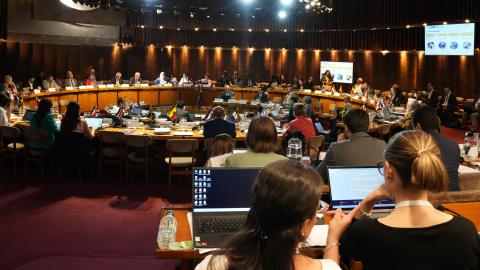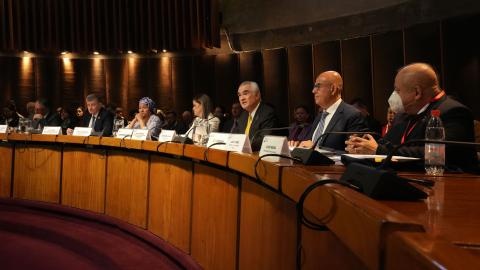News
Remarks by Alicia Bárcena, Executive Secretary of the Economic Commission for Latin America and the Caribbean (ECLAC), at the opening of the seminar to support the CELAC Plan for Food and Nutrition Security and the Eradication of Hunger 2025
Santiago,
10 March 2015
Distinguished representatives of the Quartet of the Community of Latin American and Caribbean States (CELAC),
Homero Arellano, Ambassador of Ecuador to Chile,
José Joaquín Salazar, Deputy Minister of Agriculture and Livestock of Costa Rica,
Norma Rodríguez, Head of Multilateral Affairs, Ministry of Foreign Affairs of the Dominican Republic,
Daniel Ortega, Deputy National Coordinator of the pro-tempore Chair of CELAC,
Raúl Benítez, Representative of the Regional Office of the United Nations Food and Agriculture Organization (FAO) for Latin America and the Caribbean,
Carlos “Chacho” Álvarez, Secretary-General of the Latin American Integration Association (LAIA),
Ladies and gentlemen of our region,
Representatives of the diplomatic corps,
Authorities of the Governments of Latin America and the Caribbean,
Colleagues of the United Nations system,
Friends,
It is truly an honour for ECLAC and for me to participate in the opening of this event, which will deepen understanding of the CELAC Plan for Food and Nutrition Security and the Eradication of Hunger 2025 and the strategy to support its implementation.
Our region is currently facing new challenges arising from changes in the dynamics of the international economy, in a context of slowing growth and trade, financial and price volatility, ever-faster technological progress and a worsening environmental crisis. In this new reality, it is difficult to build on —and even, in some countries, to sustain— the progress made in reducing poverty, indigence and inequality.
We at ECLAC believe food and nutrition security to be an issue of utmost importance. In a region where there is enough food to meet the needs of all of the population, 71 million people (12%) live below the indigence line (cannot afford a basic food basket), 37 million (6.1%) are undernourished (receive less than the minimum calorific intake), 13.3% of children under age five suffer chronic undernutrition (stunting) and body weight and obesity problems increase daily, with 7% of children above the expected weight for their age and 23% of adults obese. Moreover, poor and vulnerable groups of the population are increasingly likely to suffer the double burden of malnutrition, which is thus becoming a further symptom of inequality in our region.
ECLAC treats equality as the ethical objective, with structural change the path towards achieving it, and politics and policy-making the instrument. Viewed thus, equality encompasses recognition of rights, dignity, autonomy, reciprocity and solidarity.
It therefore gives us great pleasures to be here today alongside FAO, a sister institution within the United Nations system, and CELAC, our region’s most inclusive multilateral organization.
Latin American integration remains a work in progress, and CELAC is playing a historic and necessary role in progress towards achieving it. I am fully committed to accomplishing this task at the personal and, of course, the institutional level. Since CELAC was established, ECLAC has provided support for its activities at meetings in Brazil, Mexico, the Bolivian Republic of Venezuela, Chile, Cuba and Costa Rica to date, assisting the countries serving as Chair, as it currently does for Ecuador.
Our commitment and support has been amply demonstrated. In early 2015, ECLAC provided assistance with the first meeting of the China-CELAC Forum, held in Beijing. At this meeting we distributed the document Exploring opportunities for cooperation on trade and investment. The 22-fold increase in bilateral trade between China and our region between 2000 and 2013 bears testimony to the importance of this issue.
At the Second Summit of Heads of State and Government of CELAC, held in Havana in 2014, the document we circulated, Natural resources: status and trends towards a regional development agenda in Latin America and the Caribbean, outlined the ECLAC vision of governance of natural resources and gave an assessment of the social situation in the region. At the Third Summit, held in San José, we presented the second version of the Economic and Social Panorama of the Community of Latin American and Caribbean States, which included data on the region’s economic, social, commercial and environmental performance.
We are currently working with the pro tempore Chair of CELAC to develop efficient mechanisms with explicit, quantifiable objectives to address the internal and external challenges facing the region. In this process, CELAC has proved to be an invaluable forum for interaction and intra- and interregional political dialogue for agreeing on, in the words of President Correa of Ecuador and President Solís of Costa Rica, “fundamental objectives and goals for the short and medium terms, that guide our work and action and whose realization must be measurable and verifiable”.
In so doing, experience in the region has led us to focus our attention on objectives and goals in six areas for action: poverty and inequality; education; science, technology, innovation and connectivity; the environment and climate change; economic and social infrastructure; and financing for development.
We are now reviewing, together with the Chair of CELAC, a document prepared last month setting out 29 medium-term goals, targets and indicators (for 2020) to monitor progress in these six areas. Implementing a regional action plan including these goals and targets will ensure that any obstacles to the regional integration process are identified in good time, that investment from both domestic and foreign sources is prioritized and that both the Latin American and Caribbean integration process and the regional identity are strengthened, by increasing these countries’ involvement and enhancing their sense of belonging.
There are undoubtedly issues that continue to hold back the regional integration process. But I am pleased to say that today is about issues that unite us, such as the aspiration for a region free of poverty, hunger and malnutrition, in which all our children are assured a diet that enables them to develop their intellectual, imaginative and creative capacities to their fullest potential. These hopes are enshrined in the CELAC Plan for Food and Nutrition Security and the Eradication of Hunger 2025, adopted at the Third Summit of Heads of State and Government of CELAC. The Plan constitutes a strategy for governance, self-determination and South-South cooperation.
We believe food and nutrition security to be crucial for its implications for both people’s well-being and dignity and the productivity of the labour force. It is a concern not only for social policy but also economic policy, understood from a broad development perspective. It also remains, as ever, an agricultural policy issue. And now we also see it as an integration-related matter, as it can help us realize our common aspirations and exploit complementarities arising from the diversity of our food and agriculture systems.
We at ECLAC see food security as part of a wider context of food and agriculture systems, which are determined by factors associated with two subsystems: firstly, social, economical and cultural systems viewed both locally —traditions, political landscape, social arrangements and population dynamics— and globally —increased urbanization and growth of the middle classes and their purchasing power. Secondly, the environmental system, both at the local level —where it determines what may be produced— and at the global level, which is becoming increasingly important as climate change manifests itself.
The CELAC 2025 Plan takes a comprehensive view of food security as the object of social, economic, agricultural and regional integration policies. Food systems should therefore ensure food security and improve social well-being, since agricultural production creates jobs and generates wealth, and access to a stable food supply at predictable prices contributes to social stability and the development of human capital. In response to the global challenges of environmental degradation and climate change, food systems should also help achieve progress in environmental security.
The Plan stresses the need to enshrine the right to food as a fundamental human right recognized at the highest legal level. It stresses the importance of family farming as a source of food for local markets and of school meals programmes as a way of developing healthy eating habits, and it paves the way for the participation of family farmers in public procurement programmes. Lastly, it highlights the importance of leveraging complementarities between countries to strengthen intraregional trade in food.
We believe that the Plan seeks neither to fetter international trade nor to promote a closed view of self-sufficient food production for domestic needs, since no country is in a position to aspire to self-sufficiency today.
Ladies and gentlemen, I would like to reiterate our commitment to supporting CELAC, alongside FAO and LAIA, in the process of implementing the Plan for Food and Nutrition Security and the Eradication of Hunger 2025, on the terms and to the extent that its member countries require.
Many thanks.

